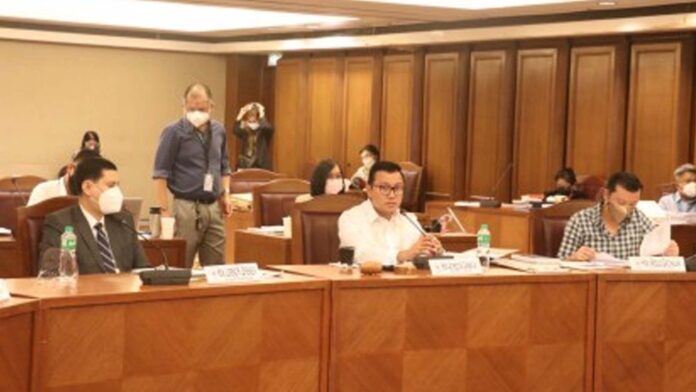The House Committee on Constitutional Amendments on Wednesday received some 555,610 signatures gathered by the Department of the Interior and Local Government (DILG) across the country to signify grassroots support for “surgical” amendments to the 1987 Constitution.
DILG Undersecretary Jonathan Malaya presented the signatures during the House hearing along with a resolution by the League of Municipalities supporting surgical Charter amendments, including the restrictive economic provisions as stated in Resolution of Both Houses (RBH) No. 2.
“If we just explain to them [public], malakas po at naiintindihan nila at sinusuportahan nila (we have a strong [case] and they would and understand and support it),” Malaya said. “There is no better time than now to lift the restrictive economic provisions of the 1987 Constitution.”
RBH No. 2, authored by Speaker Lord Allan Velasco, seeks to amend restrictive provisions of the Constitution by adding the phrase “unless otherwise provided by law” to sections of Articles XII, XIV and XVI.
Meanwhile, three professors emeritus from the University of the Philippines School of Economics (UPSE) backed the move to amend the Constitution’s economic provisions in order to make the Philippines more appealing to investors and help accelerate economic recovery.
Dr. Ernesto Pernia, former National Economic and Development Authority (NEDA) chief, said changing the economic provisions of the Charter is timely because the economy is “getting out of the hole little by little — and we need to accelerate that getting out of the hole.”
Pernia pointed out that because the country has been so closed in terms of foreign direct investments, the country cannot be competitive with its Asean neighbors, much less in the global economy.
“That is why easing or lifting the provisions on foreign participation in the constitution is critical,” Pernia said.
Dr. Gerardo Sicat, the founder of the Philippine Institute for Development Studies (PIDS), described the current economic provisions of the Constitution as “the original sin” responsible for hindering the country to progress in the attraction of foreign direct investments.
Sicat, also a former NEDA chief, said that amending the Charter, together with complementary and wise economic policies, would lead to sustained and a higher level of per capita GDP growth; higher level of employment for Filipino workers; improved overall level of productivity for the Filipino worker; and better nutrition of our worker’s children and capability to support their schooling.
Other outcomes also include enhanced capacity of workers to finance family housing and other needs; the improved capacity for the state, through an upgrade of its finances, to undertake programs to ameliorate the conditions of those in poverty; and a rising standard of living for all Filipinos.
Dr. Raul Fabella, the only Filipino economist recognized as a National Scientist, agreed with the view “that the lifting of the constitutional limit on foreign ownership will make the Philippines more foreign investment-friendly.”
Fabella said that he favored the lifting of restrictions on the foreign ownership of land, arguing that land should be owned by whoever can make it more productive, regardless of citizenship.
“My belief is that who can make the land flower best should own it; the land should be able to produce as much as it can… and citizenship is not a condition for who makes flower the best,” he said. (PNA)






